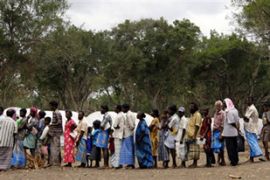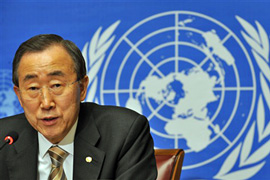Sri Lanka keeps state of emergency
Government says power to hold suspects is aimed at preventing Tamil Tigers’ resurgence.

Under the state of emergency, police can arrest, enter homes and seize evidence without warrants and hold those they arrest for 18 months without trial.
Checkpoints set up
The government said it suspects that suicide bombers remain in the capital Colombo and have adopted a low profile.
Dozens of checkpoints have been set up and officials are conducting random searches of vehicles in the capital and at transportation terminals, a favorite target of bombers.
Veerasingham Anandasangaree, a Tamil politician, said it was unfair to keep the emergency powers in place, since most of the Tamil people “gave full support to the army to liberate them. If they are treated in this manner, there is no justice at all”.
But officials said they are currently holding 9,100 separatist prisoners, and while many would be released for “rehabilitation”, several thousand others would be prosecuted on suspicion of involvement in terrorist acts.
There are currently more than 250,000 civilians living in government-run camps.
‘Right to justice’
Colombo’s decision to keep the state of emergency came as Navi Pillay, the UN high commissioner for human rights, told a UNHRC emergency summit in Geneva that “establishing the facts is crucial to set the record straight regarding the conduct of all parties in the conflict”.
“Victims and survivors have a right to justice and remedies,” she said on Tuesday.
Pillay also called for an independent investigation into the atrocities alleged by the two opposing sides in Sri Lanka’s civil war.
| Focus: Sri Lanka | ||||||||||

|
Bangladesh, South Korea and Uruguay joined a group of nations calling for Sri Lanka to allow aid agencies into camps holding tens of thousands of people who fled the northwest war zone.
Norway, which played a key role in mediations between the LTTE and the Sri Lanka government before the fighting ended, called for “full and unhindered humanitarian access” to survivors of the conflict and said that journalist must also be allowed to report freely in the area.
“The affected people must be able to return to their homes and to normal, peaceful lives as soon as possible,” Oslo’s representative said.
Norway also called for an investigation into reports of abuses by both sides during the war.
Austria emphasised the Sri Lankan government’s responsibility to care for all minorities in the country, including Tamils and Muslims.
Humanitarian access
Sri Lanka and other allies such as China, Russia, Sudan, Iran and Venezuela presented a resolution to the UN forum emphasising the right of states to manage their own matters without external interference.
The resolution also called for financial assistance to help with reconstruction following the damage caused by the fighting.
India, Pakistan, Singapore, Brazil, Saudi Arabia, Syria, Thailand and many others supported the resolution.
Many of them stressed the importance of focusing on the next steps for the country rather than dwelling on what occured during the conflict.
 |
| Ban has been on visits to Sri Lanka to assess the humanitarian situation first-hand [AFP] |
Mahinda Samarasinghe, Sri Lanka’s minister of disaster management and human rights, told the gathering in Geneva that his government was “sick and tired” of pressure from abroad and that people would be allowed to return to their homes noce reconstruction and demining were completed.
Switzerland, backed by 30 states including Britain, France, Mexico and Canada, presented a competing text that called for “full, safe and unhindered access of humanitarian assistance to all person in need throughout the country”.
The draft also said that Sri Lanka smust avoid discriminating as it distributes the aid it will receive.
While Switzerland’s draft encouraged Sri Lanka to investigate allegations of abuse and enforce justice, it did not call for an outside inquiry.
The International Committee of Red Cross (ICRC) said it is still barred from visiting some camps in the northwest, where people are being held, and that it had visited 2,500 detainees so far this month.
Jakob Kellenberger, president of the ICRC, said he had asked the Sri Lankan government for complete access to the camps to check on conditions of the displaced and monitor how they were being treated.
